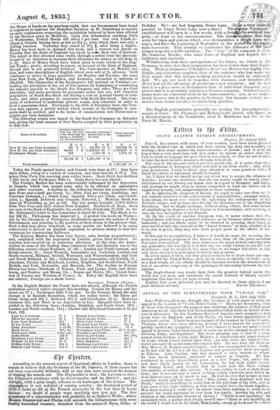CO Quatro.
According to the present aspect of theatrical affairs in London, there is reason to believe that the Germans at the St. James's, if their career has not been remarkably brilliant, will at any rate have received the honour of ringing the season out. The Haymarket is shut; the Lyceum is shut ; the Princess's continues with its Sardanapalus and its Macbeth ; and the Adelphi, with a grim laugh, adheres to its burlesque of the former. The atmosphere is not redolent of coming novelty ; the theatrical period of 1852-3 looks as old as the French monarchy in the last days of Louis Quince : we doubt if people want anything new just yet. The first symptoms of a rejuvenescence will probably be at Sadler's Wells ; where Messrs. Greenwood and Phelps will astonish the Islingtonians with some fieehly burnished treasure, snatched from the mines of Dm, Dilke, or
Dodsley. No l—we had forgotten Drury Lane. (ItJ practice to forget Drury Lane now-a-days.) Tha „Ina establishment will open in a few weeks, with a fo wortizof tra- .
gedy,—at least so say announcements. The less displays that 11* ,:;,"; sense for times and seasons Which ever distinguishes a Hi.:40 Lane ni.44,..; nager, and fixes the beginning of September as the period'ft■tiipPsiti-,i mate recreation. This attempt to counteract the influence of-S.VParAF tridges bespeaks a noble ambition. The " star" of the company is to be Mr. Gustavus Brooke ; who takes leave of England and departs for— California and Australia.
Withdrawing from these anticipations of the future, we return to the Germans, to state that their termination has been better than their begin- ning. Their performance of Schiller's Brant von Messina was highly cre- ditable, and somewhat surprised those of the audience who had made up their minds that this antique-looking production would be extremely dull. We are not used to tragedies with choruses, and therefore Die Braid had all the advantage of producing a new sensation ; and the fact that it is a piece more of declamation than of individual character, only proves that it is peculiarly suited to a German company. Schiller's noble lyrics were cut somewhat short in the representation ; not, as we under- stand, because this is the practice in Germany, but because certain me- mories were found too short to retain long speeches.


























 Previous page
Previous page